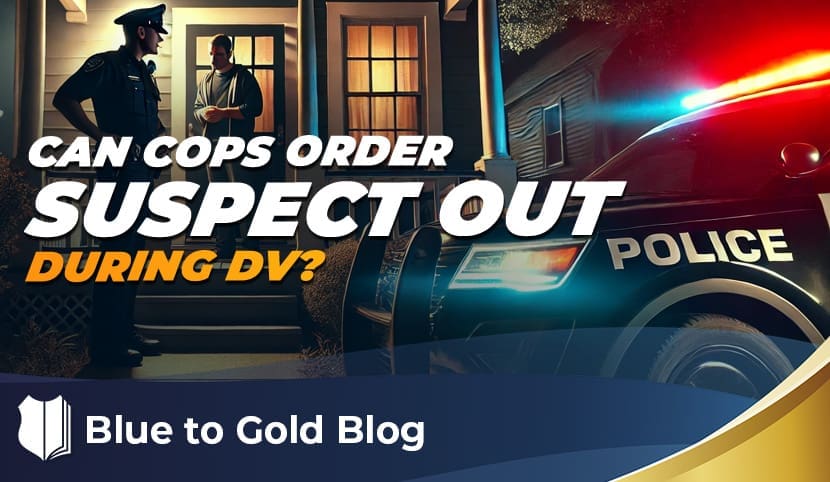This question comes from an officer in Texas, and it has a few moving parts. For simplicity, I’ll frame it as: Can we order domestic violence suspects out of their home?
Now, this situation is more complex than it sounds, but let’s keep that as the central focus. I’ll provide some context to help clarify.
The officer explains: they were called to investigate a domestic violence incident—referred to as “family violence” in Texas. The victim initially told dispatch they were assaulted, stating explicitly, “Yes, I was hit.” However, when officers arrived on the scene, the victim became uncooperative. More importantly, the suspect refused to come outside to speak with the officers, and both parties denied the officers entry into the home.
So, the officer asks: Can we order the suspect out of the home for the investigation?
The Short Answer:
Yes, you can order them out. This would be a lawful order because you also have the authority to enter the home under certain circumstances. Let me explain this further.
Breaking It Down:
Let’s start with a general principle: even if an officer has reasonable suspicion or probable cause to believe someone inside a home has committed a crime, the person inside is still protected by their Fourth Amendment right to privacy. That means officers cannot simply order someone to come out or threaten additional charges, such as obstructing or evading, if they refuse to comply.
This is because entering a home—or forcing someone out of it—requires either a warrant or an exception to the warrant requirement. In this case, the two most relevant exceptions are consent and exigency (emergency circumstances).
- Consent: If the suspect or another occupant consents, officers can enter the home. However, in this scenario, no one is giving consent, so that doesn’t apply.
- Exigency (Emergency Aid Exception): This allows officers to enter a home without a warrant if there’s an urgent need to protect someone from harm.
Applying Exigency to Domestic Violence Calls:
In domestic violence situations, exigency can often justify entry. Here’s why: the victim initially told dispatch they were assaulted. When officers arrived, the victim changed their story and became uncooperative. This could indicate coercion or a hostage situation—for example, the suspect might be threatening the victim to get the officers to leave. Officers cannot ignore this possibility.
Let me quote the great Wayne LaFave, a renowned expert on search and seizure, who explains exigency like this:
“The question is whether there were reasonable grounds to believe that some kind of emergency existed. That is, whether there is evidence which would lead a prudent and reasonable officer to see a need to act. The officer must point to specific, articulable facts which, taken with rational inferences, reasonably warrant that intrusion.”
In simpler terms, officers must assess the situation based on the facts they have at the moment. Even if the victim tells officers, “Everything’s fine, leave us alone,” the officers must consider the potential consequences of inaction. Would it be dereliction of duty to leave without ensuring everyone’s safety? In many cases, the answer is yes.
However, remember: entering a home for the sole purpose of “making sure everything is okay” is not enough. You must have specific facts pointing to an emergency.
Ordering the Suspect Out:
So, can you order the suspect out of the home? Yes, because you have lawful authority to enter the home under the exigency exception. Ordering the suspect out is a way to control the situation on your terms, which is safer for everyone involved. If the suspect refuses to comply, you can then proceed with entering the home under exigent circumstances.
What If the Suspect Flees Inside the Home?
Now let’s address a related question: what if the suspect is outside the home, but when they see officers, they run back inside?
In Texas, this would generally be considered evading arrest—an arrestable offense. The act of fleeing into the home, coupled with exigent circumstances (e.g., the possibility of the suspect arming themselves or harming others), would justify entry under the hot pursuit doctrine.
Family violence calls are some of the most dangerous situations officers face. Allowing a suspect to flee inside the home could escalate the risk of violence, such as the suspect barricading themselves or grabbing a weapon. Officers are not expected to let that happen.
What If the Suspect Is Already Inside and Refuses to Come Out?
If the suspect is already inside and refuses to come out, the situation changes slightly. If you see the suspect through a window and they retreat further into the home, that alone may not constitute evading under Texas law. However, I’m not a statute expert—your department’s legal advisors can provide clarity on how evading is defined in your jurisdiction.
Final Thoughts:
To summarize:
- Can you order a suspect out of the home? Yes, if you have lawful authority to enter the home, you can issue a lawful order for the suspect to come out.
- What if the suspect flees inside the home? If they flee inside after being outside, this is likely evading, and exigent circumstances (e.g., safety concerns) justify entry.
- What if the suspect is already inside and refuses to come out? You may still enter the home under exigent circumstances, but retreating further inside may not constitute evading.
Ultimately, these situations require officers to make judgment calls based on the facts at hand. Always ensure your actions are grounded in law and department policy.
I hope this answers the question and helps move the ball forward, even by an inch! If you like what I’m doing here, please do me a favor: share it with your friends. Let’s get these important questions answered.
Until next time, my friends, stay safe.











